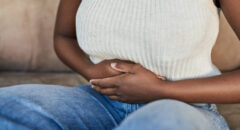
The world knows Corinne Foxx as the eldest daughter of singer, actor, comedian and TV host Jamie Foxx, but she is so much more than that. She has made a name for herself with several acting credits under her belt, including “Safety” and “47 Meters Down: Uncaged”. She also executive produced the Netflix comedy “Dad Stop Embarrassing Me!” and co-hosts “Beat Shazam” with her dad. Now she is adding advocate to the list.
Foxx began experiencing painful periods at the age of 13, but it wasn’t until 2018 that she would learn the cause was actually endometriosis.
“I started to experience symptoms of endometriosis, probably when I started menstruating, but I wasn’t aware of the even worse symptoms of endometriosis. From the ages of 13-24, my symptoms just kept getting worse,” the 29-year-old shares.
Although the pain often prevented Foxx from being able to go to work and school, she thought it was normal.
“It wasn’t until I was on the bathroom floor in the fetal position that one of my roommates told me, ‘You need to see somebody. This isn’t normal. This isn’t how you should be feeling,'” Foxx tells ESSENCE.
From there, she began her diagnosis journey, which required her to see five to six doctors before the word endometriosis was even mentioned.
RELATED: Day 1: Just Diagnosed with Endometriosis
“…I had been told I had various ailments, including bladder cancer, something no one ever wants to hear at a doctor’s office. When I did get my endometriosis diagnosis, there was no clear path for me to get treatment. I had to do my research, advocate for myself and demand to keep being seen,” Foxx adds.
The experience was traumatic for Foxx, who first heard the word endometriosis from a male doctor that made inappropriate comments during her doctor’s appointment.
“I already didn’t feel very comfortable, and he sort of blurted out the word “endometriosis” without giving me any context as to what that meant. And my only familiarity with it was from Lena Dunham, who has spoken about her endometriosis journey. She had a hysterectomy. So I assumed that endemic endometriosis meant that I couldn’t have children and I just sobbed,” Foxx recalls.
With no resources to utilize, Foxx took matters into her own hands and did her own research.
“It wasn’t until later I looked into my family history and realized my grandmother had endometriosis, my aunt had endometriosis, and they all had children and were healthy. I advocate for also doing your research within your family and








